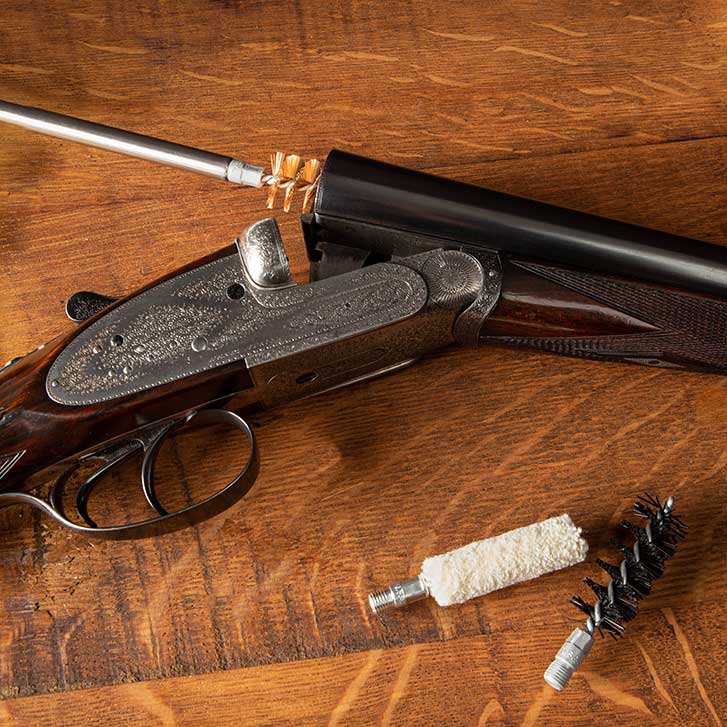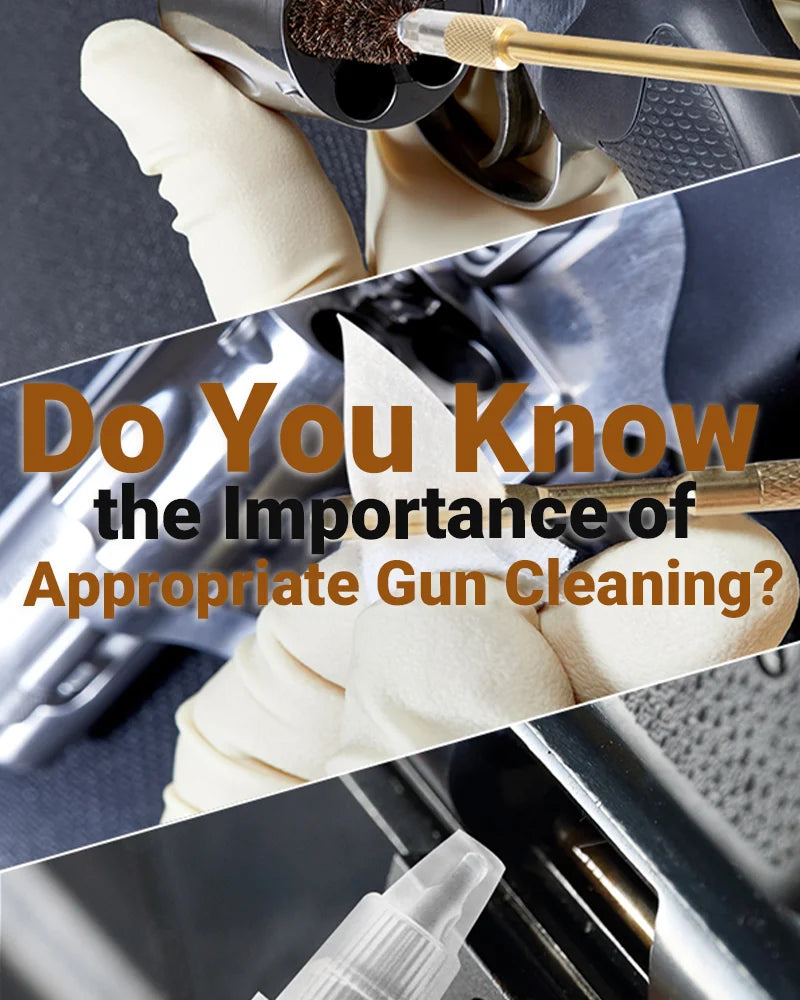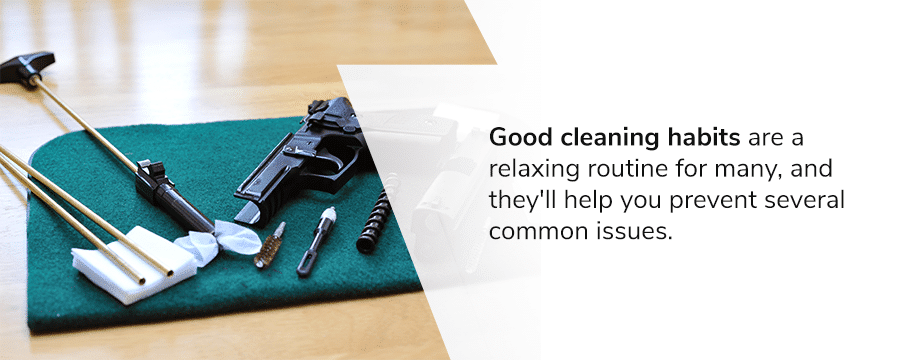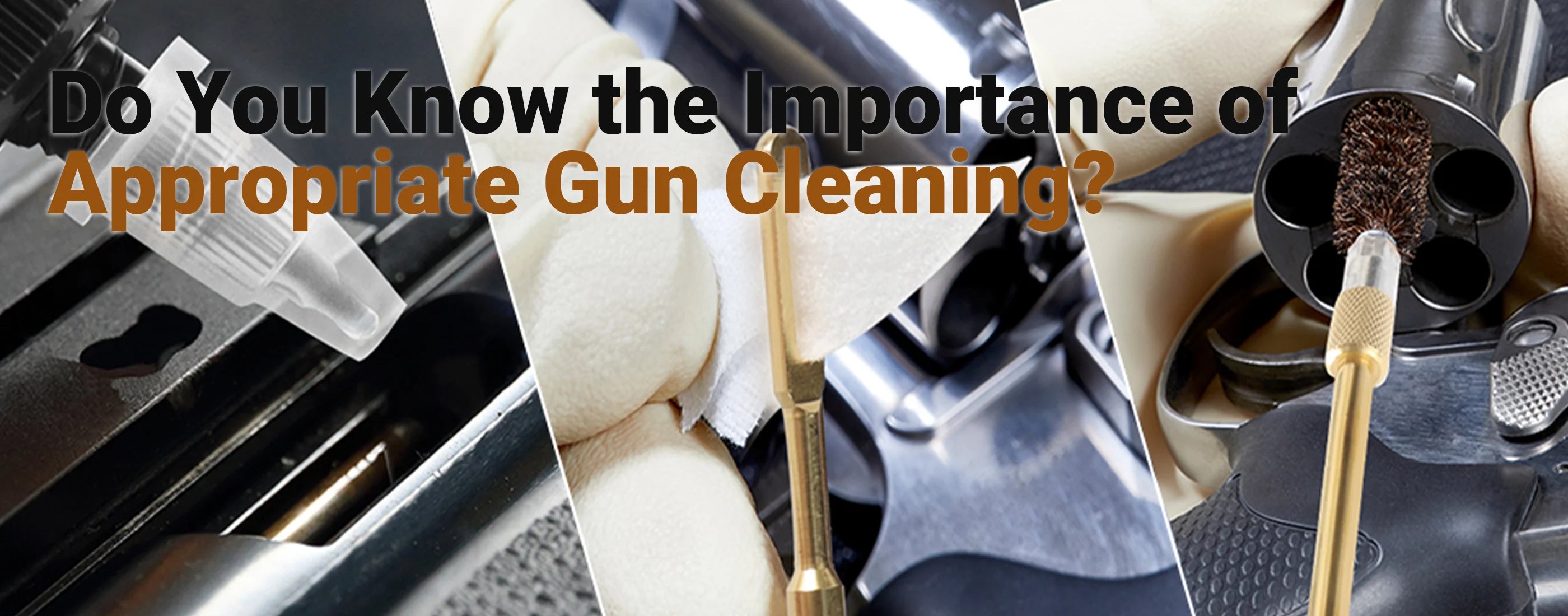Contents
- I. The Importance of Proper Gun Cleaning
- II. The Dangers of Neglecting Gun Maintenance
- III. Common Gun Cleaning Mistakes to Avoid
- IV. Essential Tools and Supplies for Gun Cleaning
- V. Step-by-Step Guide to Proper Gun Cleaning
- VI. Frequently Asked Questions about Gun Cleaning
- 1. How often should I clean my gun?
- 2. What happens if I don’t clean my gun regularly?
- 3. What cleaning supplies do I need?
- 4. How do I clean the different parts of my gun?
- 5. Can I use any cleaning solvent or oil for my gun?
- 6. How long does it take to clean a gun?
- 7. Can I clean my gun without professional help?
- 8. Are there any safety precautions I should take while cleaning my gun?
- VII. Benefits of Regular Gun Cleaning
- VIII. How Often Should You Clean Your Gun?
- IX. Expert Tips for Effective Gun Cleaning
I. The Importance of Proper Gun Cleaning

Proper gun cleaning is an essential practice that every gun owner should prioritize. Whether you are a seasoned shooter or a beginner, maintaining your firearms in optimal condition is crucial for their performance, longevity, and most importantly, safety. In this section, we will explore the significance of proper gun cleaning and why it should never be overlooked.
1. Ensures Reliable Functionality
Regularly cleaning your firearms helps to ensure their reliable functionality. As you shoot, residue, dirt, and carbon build-up can accumulate inside the barrel, chamber, and other critical components of the gun. Over time, this accumulation can affect the gun’s performance, causing jams, misfires, or even complete malfunctions. By regularly cleaning your gun, you remove these impurities and maintain its smooth operation.
2. Enhances Accuracy
A clean gun is a more accurate gun. When residue and carbon deposit inside the barrel, they can affect the bullet’s trajectory, leading to decreased accuracy. By keeping your gun clean, you minimize the risk of inconsistencies in bullet flight, ensuring that your shots hit their intended targets with precision.
3. Prolongs Lifespan
Proper gun cleaning can significantly extend the lifespan of your firearms. The buildup of dirt and debris can lead to corrosion, which can damage the internal components of the gun over time. By regularly cleaning and lubricating your firearms, you prevent rust and corrosion, preserving their longevity and saving you from costly repairs or replacements.
4. Promotes Safety
One of the most critical reasons for proper gun cleaning is safety. A dirty firearm is more prone to accidents and malfunctions. Residue and debris can interfere with the gun’s mechanisms, leading to unintended discharges or even catastrophic failures. By regularly cleaning your gun, you minimize the risk of accidents and ensure that your firearm functions as intended, providing a safe shooting experience for you and those around you.
5. Demonstrates Responsibility
Being a responsible gun owner means taking the necessary steps to maintain your firearms properly. Cleaning your gun regularly not only ensures its performance and safety but also reflects your commitment to responsible gun ownership. It shows that you understand the importance of keeping your firearms in top condition and that you take the necessary precautions to prevent accidents or malfunctions.
II. The Dangers of Neglecting Gun Maintenance

Proper gun cleaning and maintenance are crucial for ensuring the safe and effective operation of firearms. Neglecting these essential tasks can have serious consequences, both for the gun owner and those around them. Here are some of the dangers that arise from neglecting gun maintenance.
1. Decreased Reliability
When a gun is not regularly cleaned and maintained, its reliability can be compromised. Dust, dirt, and residue can accumulate inside the gun, affecting its mechanical components. This can result in malfunctions, such as misfires or jams, which can be dangerous in critical situations. Regular cleaning and lubrication help ensure that the gun functions smoothly and reliably.
2. Increased Risk of Accidents
A neglected gun is more prone to accidents. Over time, debris and fouling can accumulate in the barrel, leading to a build-up of pressure upon firing. This can result in a burst barrel or other catastrophic failures, putting the shooter and bystanders at risk of serious injury or even death. Regular maintenance, including barrel cleaning, helps prevent such accidents by keeping the gun in optimal condition.
3. Rust and Corrosion
Guns are often exposed to moisture, whether it’s from humidity in the air or contact with water during outdoor activities. Neglecting proper cleaning and maintenance can cause rust and corrosion to develop on the gun’s metal surfaces. Rust not only degrades the appearance of the firearm but also affects its functionality. Corroded parts may fail to function correctly, leading to potential malfunctions and safety risks.
4. Reduced Accuracy
Accurate shooting requires a gun that is properly maintained. Over time, fouling and carbon buildup can affect the gun’s barrel and other components, leading to decreased accuracy. Neglecting regular cleaning can hinder the bullet’s trajectory and impact point, resulting in missed targets or inconsistent performance. By keeping the gun clean and free from debris, shooters can maintain optimal accuracy and overall shooting performance.
5. Voiding Warranty
Many firearms come with warranties that require proper maintenance to remain valid. Neglecting to clean and maintain the gun as recommended by the manufacturer can void the warranty, leaving the owner responsible for any repairs or replacements. By staying diligent with gun maintenance, owners can ensure that their warranty remains intact and any potential issues are covered.
III. Common Gun Cleaning Mistakes to Avoid

Guns are powerful tools that require regular cleaning and maintenance to ensure their proper functioning and longevity. However, many gun owners make common mistakes when cleaning their firearms, which can lead to issues and even accidents. To help you avoid these pitfalls, here are some common gun cleaning mistakes to steer clear of:
1. Using Incorrect Cleaning Products
One of the biggest mistakes gun owners make is using the wrong cleaning products. Using harsh chemicals or solvents that are not specifically designed for firearms can damage the gun’s finish or even corrode its internal components. Always use cleaning solvents and lubricants that are recommended by the manufacturer, as they are formulated to safely and effectively clean your firearm.
2. Neglecting to Disassemble the Gun
Another common mistake is failing to fully disassemble the gun during the cleaning process. While it may be tempting to simply clean the external surfaces, dirt, debris, and residue can accumulate in hard-to-reach areas, affecting the gun’s performance. Take the time to disassemble the firearm according to the manufacturer’s instructions, cleaning each part thoroughly before reassembly.
3. Over-Oiling the Gun
While it’s important to lubricate your firearm to ensure smooth operation, over-oiling can cause its own set of problems. Excessive oil can attract dust and dirt, creating a buildup that can impede the gun’s functionality. Additionally, too much oil can lead to malfunctions and even dangerous accidents. Apply a thin, even layer of lubricant to the necessary parts, and wipe away any excess oil.
4. Rushing the Cleaning Process
Proper gun cleaning requires time and attention to detail. Rushing through the process can result in inadequate cleaning and potential issues down the line. Take your time to thoroughly clean each component, ensuring that all dirt, carbon, and residue are removed. Pay special attention to the barrel, breach face, and firing pin area, as these are critical for the gun’s performance.
5. Failing to Properly Store the Gun After Cleaning
After cleaning your firearm, it’s important to store it correctly to maintain its condition. Many gun owners make the mistake of leaving their guns exposed to humidity, dust, or extreme temperatures, which can cause rust or other damage. Invest in a quality gun safe or storage case that provides protection from these elements, ensuring your firearm remains in optimal condition.
By avoiding these common gun cleaning mistakes, you can keep your firearm in top shape and ensure its reliable performance when you need it most. Remember to follow the manufacturer’s guidelines and take the time to clean and maintain your gun regularly. Responsible gun ownership includes proper care and maintenance, so make it a priority.
IV. Essential Tools and Supplies for Gun Cleaning

When it comes to properly cleaning your gun, having the right tools and supplies is essential. Here are some must-have items that every gun owner should have in their cleaning kit:
1. Cleaning Solvent
A good cleaning solvent is the foundation of any gun cleaning kit. It helps to break down and remove dirt, carbon buildup, and other residues from the barrel, action, and other parts of the gun. Look for a solvent specifically designed for firearms, as they are formulated to be effective yet gentle on the gun’s finish.
2. Bore Brush
The bore brush is used to scrub the inside of the gun’s barrel, removing fouling and deposits. Make sure to choose a brush that is the correct size for your gun’s caliber. It’s also recommended to have different brushes for different types of cleaning, such as nylon brushes for general cleaning and bronze brushes for more stubborn fouling.
3. Cleaning Patches
Cleaning patches are small pieces of cloth or synthetic material that are used to apply cleaning solvent to the barrel and other parts of the gun. They are also used to remove excess solvent and debris. Make sure to use high-quality patches that are lint-free to avoid leaving fibers behind.
4. Gun Oil
Gun oil is essential for lubricating the moving parts of your firearm to ensure smooth operation and prevent corrosion. Look for a quality gun oil that provides long-lasting lubrication and protection against rust and moisture. Apply a thin coat of oil to the appropriate areas after cleaning.
5. Cleaning Rod and Jag
A cleaning rod and jag are used to push cleaning patches through the barrel. Choose a cleaning rod that is sturdy and won’t damage the barrel. Jags are attachments that hold the cleaning patch in place and ensure a proper fit inside the barrel.
6. Toothbrush and Q-Tips
These small tools are handy for reaching and cleaning hard-to-reach areas, such as grooves, crevices, and corners. The toothbrush can be used to scrub larger parts, while Q-tips are great for precision cleaning.
7. Brass Cleaning Picks
Brass cleaning picks are useful for removing stubborn fouling or debris from tight spots. They are gentle enough not to damage the gun’s finish but strong enough to get the job done.
8. Microfiber Cloth
A microfiber cloth is ideal for wiping down the gun’s exterior and removing any fingerprints, smudges, or remaining debris. It is soft and lint-free, ensuring a clean and polished finish.
By having these essential tools and supplies in your gun cleaning kit, you can ensure that your firearm is properly maintained and in optimal condition for reliable performance. Remember to clean your gun regularly according to the manufacturer’s instructions and store it safely to prolong its lifespan.
V. Step-by-Step Guide to Proper Gun Cleaning

Properly cleaning your gun is essential to ensure its longevity, reliability, and safe operation. Regular maintenance and cleaning improve the performance of your firearm, prevent malfunctions, and reduce the risk of accidents. Here is a step-by-step guide to help you clean your gun effectively:
Gather the necessary tools and materials
Before you start cleaning your gun, make sure you have all the required tools and materials. This includes a cleaning rod, cleaning patches, bore brush, solvent, lubricant, and a cleaning mat or work surface. Having everything ready beforehand will save you time and ensure a smooth cleaning process.
Unload and disassemble the gun
Prior to cleaning, always ensure that your gun is unloaded. Double-check the chamber, magazine, and any other potential sources of ammunition. Once unloaded, follow the manufacturer’s instructions to disassemble the gun. Take note of the parts and their arrangement for easier reassembly later.
Clean the barrel and chamber
Begin by attaching the bore brush to the cleaning rod and applying solvent to it. Insert the rod into the barrel and scrub back and forth to remove fouling and debris. Afterward, attach a cleaning patch to the rod and run it through the barrel to remove any remaining residue. Repeat this process until the patches come out clean.
Clean the slide, frame, and other components
Using a clean cloth or brush, wipe down the slide, frame, and other external components of the gun. Pay attention to areas where dirt and carbon buildup may accumulate. Use a solvent-soaked brush to remove stubborn grime. Ensure that all parts are thoroughly cleaned and free from debris.
Inspect and lubricate
Once cleaned, inspect all the components for any signs of wear, damage, or corrosion. Replace any worn-out parts if necessary. After inspection, apply a light coat of lubricant to the moving parts of the gun to ensure smooth operation. Be sure to follow the manufacturer’s guidelines on proper lubrication.
Reassemble and function check
Carefully reassemble the gun, ensuring that all parts are correctly aligned and secured. Once reassembled, perform a function check by dry-firing the gun without any ammunition. This will help ensure that all components are properly functioning and that the gun is safe to use.
Following these step-by-step instructions will help you maintain your firearm in optimal condition. Remember to always refer to the manufacturer’s guidelines for specific cleaning instructions for your particular gun model. Regular cleaning and maintenance will not only keep your gun in top shape but also contribute to your overall shooting experience and safety.
VI. Frequently Asked Questions about Gun Cleaning
Gun cleaning is an essential aspect of firearm maintenance that should not be overlooked. To help you better understand the importance of proper gun cleaning, here are some frequently asked questions:
1. How often should I clean my gun?
The frequency of gun cleaning depends on various factors, such as the type of firearm, frequency of use, and environmental conditions. As a general rule, it is recommended to clean your gun after every use or at least once every few months if it’s not frequently used.
2. What happens if I don’t clean my gun regularly?
If you neglect regular gun cleaning, several problems can arise. Firstly, the accumulation of dirt, debris, and residue can affect the firearm’s performance, leading to malfunctions and decreased accuracy. Secondly, moisture can cause rusting, which can deteriorate the gun’s components over time. Therefore, regular cleaning is crucial to maintain the functionality and longevity of your firearm.
3. What cleaning supplies do I need?
When it comes to gun cleaning, you will need a few essential supplies. These include a cleaning rod, bore brushes, cleaning patches, gun oil or lubricant, a cleaning solvent, a cleaning mat or pad, and a gun cleaning kit. Each component plays a vital role in ensuring thorough cleaning and proper maintenance of your firearm.
4. How do I clean the different parts of my gun?
Gun cleaning involves disassembling the firearm and cleaning each part individually. Start by removing the magazine (if applicable) and ensure the gun is unloaded. Then, follow the manufacturer’s instructions or consult a gunsmith to disassemble the firearm properly. Clean the barrel, slide, frame, and other components using the appropriate tools and solvents. Finally, apply gun oil or lubricant to prevent corrosion and ensure smooth functioning.
5. Can I use any cleaning solvent or oil for my gun?
No, it is important to use cleaning solvents and oils specifically designed for firearms. Using the wrong solvent or oil can cause damage to the gun’s finish, internal components, or even affect its overall performance. Always check the manufacturer’s recommendations or consult a professional to ensure you are using the correct cleaning products for your specific firearm.
6. How long does it take to clean a gun?
The time required to clean a gun depends on various factors, including the type of firearm, level of dirtiness, and your experience with gun cleaning. On average, a thorough cleaning can take anywhere between 30 minutes to an hour. However, it’s important not to rush the process as proper cleaning ensures optimal performance and longevity.
7. Can I clean my gun without professional help?
Absolutely! Gun cleaning is a task that can be done by firearm owners themselves. With the right tools, knowledge, and attention to detail, you can effectively clean and maintain your gun without the need for professional assistance. However, if you are unsure or uncomfortable, it is always advisable to seek guidance from a professional gunsmith.
8. Are there any safety precautions I should take while cleaning my gun?
Yes, safety should always be a top priority when handling firearms. Ensure the gun is unloaded and the magazine is removed before starting the cleaning process. Additionally, always work in a well-ventilated area away from flammable materials. Follow the manufacturer’s guidelines and exercise caution while using solvents and oils, as some may be harmful if ingested or come into contact with the skin.
By understanding the importance of proper gun cleaning and following the recommended practices, you can ensure the safety, functionality, and longevity of your firearm. Regular cleaning and maintenance not only contribute to optimal performance but also instill confidence in your shooting experience.
VII. Benefits of Regular Gun Cleaning
Regular gun cleaning is essential for maintaining the performance and longevity of your firearm. Not only does it ensure the safety of the user, but it also offers several benefits that every gun owner should be aware of.
1. Enhanced Safety
By regularly cleaning your gun, you minimize the risk of malfunctions, misfires, and other mechanical failures. A clean gun is a reliable gun, reducing the chances of accidents or injuries while handling or shooting. Proper cleaning removes debris, residue, and build-up that can impair the function of the firearm.
2. Improved Accuracy
A clean gun leads to better accuracy. Over time, fouling and carbon residue can accumulate in the barrel and affect the bullet’s trajectory. Regular cleaning removes these contaminants, allowing the bullet to travel smoothly and consistently, resulting in improved shooting accuracy.
3. Longevity of the Firearm
Proper maintenance and cleaning increase the lifespan of your firearm. Regularly removing dirt, debris, and corrosion ensures that the moving parts operate smoothly and reduces the risk of component failure. By taking care of your gun, you can enjoy years of reliable use and preserve its value.
4. Prevention of Rust and Corrosion
Guns are susceptible to rust and corrosion, especially if exposed to moisture or harsh conditions. Regular cleaning helps prevent these issues by removing any moisture and applying protective lubricants. By keeping your gun clean and well-oiled, you safeguard it against the damaging effects of rust and corrosion.
5. Cost Savings
In the long run, regular gun cleaning can save you money. By preventing malfunctions and extending the life of your firearm, you reduce the need for costly repairs or replacements. Additionally, a well-maintained gun holds its value better if you ever decide to sell or trade it.
VIII. How Often Should You Clean Your Gun?
Proper gun maintenance is crucial for ensuring the safety and reliability of your firearm. Regular cleaning not only helps to extend the lifespan of your gun, but it also prevents malfunctions and keeps it in optimal condition. So, how often should you clean your gun?
1. Frequency Depends on Usage
The frequency of gun cleaning largely depends on how often you use your firearm. If you are a regular shooter or use your gun for self-defense, it is recommended to clean it after every use or at least once a month. Regular usage leads to the buildup of fouling, residue, and debris, which can affect the performance of your gun.
2. Consider the Environment
The environment in which you use your gun also plays a role in determining the cleaning frequency. If you often shoot in dusty or dirty conditions, it is advisable to clean your firearm more frequently to prevent the accumulation of grit and dirt. Exposure to moisture or salty air may also require more frequent cleaning to prevent corrosion.
3. Type of Ammunition
The type of ammunition you use can affect the cleaning schedule as well. Some types of ammo produce more fouling or residue, which can build up faster in your gun. If you are using dirty-burning ammunition, it is recommended to clean your firearm more frequently to ensure proper functioning.
4. Manufacturer’s Recommendations
Always refer to the manufacturer’s recommendations for cleaning your specific firearm model. Different guns may have different cleaning requirements, and following the manufacturer’s guidelines will help you maintain your gun effectively. They might provide specific instructions on the frequency of cleaning or suggest any additional maintenance steps.
5. Signs of Wear or Malfunction
Pay attention to any signs of wear or malfunction in your gun. If you notice a decline in accuracy, misfires, or any other issues, it might indicate the need for cleaning or further inspection. Regularly inspecting your firearm for any visible signs of wear or damage is essential for keeping it in good working condition.
IX. Expert Tips for Effective Gun Cleaning
Proper gun cleaning is essential to maintain the performance and longevity of your firearm. To ensure that you clean your gun effectively, follow these expert tips:
1. Use the Right Cleaning Solvents and Lubricants
Choose cleaning solvents and lubricants specifically designed for firearms. Avoid using household cleaners or WD-40 as they can damage the gun’s finish and internal components. Invest in high-quality gun cleaning solvents and lubricants to achieve optimal results.
2. Disassemble the Gun Carefully
Before cleaning, make sure to unload the firearm and remove any ammunition. Follow the manufacturer’s instructions to disassemble the gun properly. Take your time and be gentle while handling the parts to prevent any damage.
3. Clean Each Component Thoroughly
Pay attention to every part of the gun, including the barrel, slide, frame, magazine, and trigger assembly. Use a cleaning rod, patches, and brushes to remove fouling, debris, and residue. Ensure that you clean hard-to-reach areas, as neglecting them can affect the gun’s performance.
4. Use Proper Tools and Brushes
Invest in high-quality cleaning tools and brushes specifically designed for firearms. Different brushes are required for cleaning the bore, slide, and other components. Using the right tools will ensure a more effective and efficient cleaning process.
5. Follow the Right Cleaning Order
Start by cleaning the barrel using a bore brush and cleaning solvent. Then, move on to cleaning the slide, frame, and other components. This sequence ensures that you remove the most stubborn fouling and residue first, leading to a more thorough cleaning.
6. Inspect and Maintain the Gun Regularly
After cleaning, inspect the gun for any wear, damage, or excessive wear on parts. Look for signs of rust or corrosion and address them immediately. Regular maintenance will help identify potential issues and prevent malfunctions.
7. Store the Gun Properly
After cleaning, apply a thin layer of lubricant to protect the gun from rust and ensure smooth operation. Store the firearm in a secure and dry location, away from extreme temperatures and humidity. Proper storage will help preserve the gun’s condition and performance.
Following these expert tips will help you clean your gun effectively and maintain its optimal performance. Remember to always prioritize safety and consult the manufacturer’s guidelines for specific cleaning instructions for your firearm.
Robert Garcia is a highly skilled and passionate individual with a deep-rooted interest in firearms. With a wealth of experience in the field, Robert has honed his expertise through years of hands-on training and practical application. His educational background includes a Bachelor’s degree in Ballistics Engineering from the prestigious University of Firearms Technology, where he specialized in advanced firearm design and functionality. Additionally, Robert has undergone extensive tactical training programs, earning certifications in marksmanship and self-defense. His dedication to staying updated with the latest advancements in firearm technology and regulations is evident in his meticulous research and detailed writing.